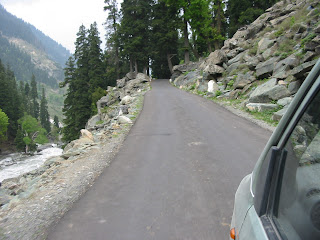Internet Haves and Have-Nots
We now have (further!) official confirmation of the Digital Divide in India.
Hardly 6% of households in urban India households have an Internet connection.
This figure reads as 0.4% for rural India.
Does this indicate infrastructure falling short or inability to afford the minimum (by today's standards) technology? Or a dismal combination of both?
Any talk of inclusive growth is at best laughable. You and I have the luxury of exploring 4G, e-social networking, shopping and seeking entertainment online when other 93% of our city and country cousins are nowhere near this kind of digital empowerment.
Read Internet revolution bypasses rural India: Survey.
To the average Internet-empowered home, the connection has become somewhat of a necessity. But among all the gigabytes that we devour daily, let us spare a thought for others for whom the Net is still a distant dream or a last priority.
And also hope that the Government's policies for empowering citizens digitally works in logical proportion with positive and meaningful efforts at ushering along national necessities like green and white revolutions.
In India, a second green revolution must be the precursor to Internet revolution, isn't that common sense?
Way back in 1996, a book titled Disconnected: Haves and Have-Nots in the Information Age was published. 16 years later, and well into the next century, the Net-Haves are all contributing to widening the gap from the Gross Have-Nots. The author William Wresch states this better - “We have met the enemy, and they are us.”
"If we are in a new age, this is an age that is still connected to the old age and still has many of its flaws. Yes, technology is producing some benefits and some freedoms. We know that the threat of satellite dishes was enough to scare South Africa into 54 creating a television network. Unfortunately, we also know the threat of satellite dishes has been enough to cause governments across the Middle East to ban their use. We know libraries across the world are now accessible electronically. We also know books around the world are still being burned.
We know that at this moment hundreds of gigabytes of information are being bounced from satellite to satellite across the sky. We also know that many of those gigabytes are lies. We know that some children can learn about the world by linking their classroom to thousands across the world. Other children wait for their classrooms to get a roof, a light bulb, a qualified teacher."
Hardly 6% of households in urban India households have an Internet connection.
This figure reads as 0.4% for rural India.
Does this indicate infrastructure falling short or inability to afford the minimum (by today's standards) technology? Or a dismal combination of both?
Any talk of inclusive growth is at best laughable. You and I have the luxury of exploring 4G, e-social networking, shopping and seeking entertainment online when other 93% of our city and country cousins are nowhere near this kind of digital empowerment.
Read Internet revolution bypasses rural India: Survey.
To the average Internet-empowered home, the connection has become somewhat of a necessity. But among all the gigabytes that we devour daily, let us spare a thought for others for whom the Net is still a distant dream or a last priority.
And also hope that the Government's policies for empowering citizens digitally works in logical proportion with positive and meaningful efforts at ushering along national necessities like green and white revolutions.
In India, a second green revolution must be the precursor to Internet revolution, isn't that common sense?
Way back in 1996, a book titled Disconnected: Haves and Have-Nots in the Information Age was published. 16 years later, and well into the next century, the Net-Haves are all contributing to widening the gap from the Gross Have-Nots. The author William Wresch states this better - “We have met the enemy, and they are us.”
An excerpt from the book -
We know that at this moment hundreds of gigabytes of information are being bounced from satellite to satellite across the sky. We also know that many of those gigabytes are lies. We know that some children can learn about the world by linking their classroom to thousands across the world. Other children wait for their classrooms to get a roof, a light bulb, a qualified teacher."


Comments
Post a Comment
i appreciate that you have some thoughts to share, and are taking the effort to do so.